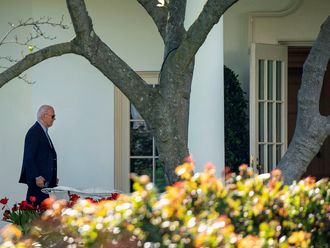WASHINGTON: The Trump administration is slashing spending on advertising and promotion for enrolment under the Affordable Care Act, a move that some critics charged was a blatant attempt to sabotage the law.
Officials with the Department of Health and Human Services, who insisted on not being identified during a conference call with reporters, said Thursday that the advertising budget for the open enrolment period that starts in November would be cut to $10 million (Dh36.7 million), compared with $100 million spent by the Obama administration last year, a drop of 90 per cent. Additionally, grants to about 100 nonprofit groups, known as navigators, that help people enrol in health plans offered by the insurance marketplaces will be cut to a total of $36 million, from about $63 million.
The officials said the administration believed that the cuts were necessary because of “diminishing returns” from advertising. They said the number of first-time enrollees in Affordable Care Act coverage fell 42 per cent this year, compared with 2016. In addition, they said that many navigator groups failed to meet their enrolment targets last year, despite sometimes receiving hundreds of thousands of dollars in federal funds.
The Senate Democratic leader, Chuck Schumer of New York, denounced the cutbacks.
“The Trump administration is deliberately attempting to sabotage our health care system,” he said. “When the number of people with health insurance declines and costs skyrocket, the American people will know who’s to blame.”
Since Republicans in Congress failed to pass legislation to repeal and replace the law, a longstanding goal of the party, President Donald Trump has stepped up attacks on the legislation and repeatedly insisted it was failing and insurance markets were imploding.
Overall, 12.2 million people selected or automatically re-enrolled in marketplace plans for 2017, although the Trump administration said in June that the number of customers who paid their premiums had dropped to 10.1 million. Similar drops have occurred in previous years after people lost coverage when they failed to pay their premiums.
The administration officials who briefed reporters Thursday said it made no sense to continue spending as much on promoting the law’s coverage options because most Americans know about them. Instead of television ads, the administration will run radio and digital ads and send emails and texts to existing enrollees, they said. They added that any outreach would emphasise that the enrolment period will be much shorter this year — from November 1 to December 15. Last year’s open enrolment period ran from November 1 through January 31.
“People are aware the products are out there,” one official said, “and they are aware they can sign up.”
Although no navigator group will lose its funding completely, the amount they get will be based on how close they came to meeting their enrolment goal for 2017. If a group reached only 30 per cent of its enrolment goal, for example, it would receive 30 per cent of the grant it got last year.
“We are moving forward by matching funding to performance,” one official said.
Another official added that last year, navigator groups enrolled about 80,000 people — less than half of what the groups aspired to, and only 0.7 per cent of overall enrollees for 2017 — in marketplace plans. Some groups, they said, enrolled only a handful of people.
But the figures they cited appeared not to include people who met with navigators to sort through coverage options but enrolled later on their own — a not insignificant group, according to past surveys on enrolment.
Navigators defended their work. Alisha Keezer, a health care navigator at the Maine Lobstermen’s Association in Kennebunk, said the cutbacks were “shocking to all of us.”
“We had no forewarning,” Keezer said. “This is heartbreaking. Here in Maine, we have helped many fishermen enrol in coverage — self-employed people who have never had health insurance before.”
The navigator groups whose funding may be cut are only in the 38 states that rely on the federal Affordable Care Act marketplace, HealthCare.gov. Twelve other states run their own marketplaces and fund their own enrolment programmes.
“It’s very disappointing that the administration is minimising the importance of in-person assistance to millions of people who have relied on it to understand how to enrol and how to use their insurance,” said Shelli D. Quenga, programme director at the Palmetto Project in South Carolina, a nonprofit group that received about $1 million to help with outreach and enrolment in the past 12 months. “These are not easy discussions for people who may have been uninsured all their lives.”
Quenga said it was not true that most eligible people now know about the coverage available under the Affordable Care Act.
“It’s ludicrous to believe that everyone now knows that the Affordable Care Act is alive and well and open for enrolment,” Quenga said. “Many people believe that the law is dead, or will be dead, based on the administration’s claims.”












